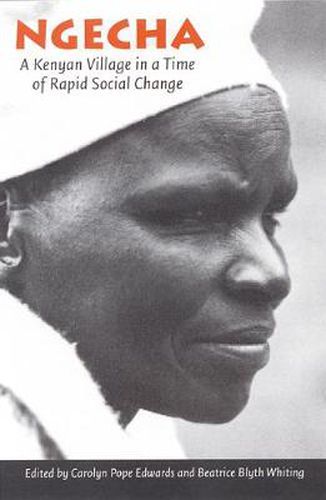Readings Newsletter
Become a Readings Member to make your shopping experience even easier.
Sign in or sign up for free!
You’re not far away from qualifying for FREE standard shipping within Australia
You’ve qualified for FREE standard shipping within Australia
The cart is loading…






Ngecha is the monumental and intimate study of modernization and nationalization in rural Africa in the early years following Kenyan independence in 1963, as experienced by the people of Ngecha, a village outside Nairobi. From 1968 to 1973 Ngecha was a research site of the Child Development Research Unit, a team which brought together Kenyan and non-Kenyan social scientists under the leadership of John Whiting and Beatrice Blyth Whiting. The study documents how families adapted to changing opportunities and conditions as their former colony became a modern nation, and the key role that women played as agents of change as they became small-scale cash-crop farmers and entrepreneurs. Mothers modified the culture of their parents to meet the evolving national economy, and they participated in the shift from an agrarian to a wage economy in ways that transformed their workloads and perceptions of isolation and individualism within and between households, thereby challenging traditional family-based morals and obligations. Their children, in turn, experienced evolving educational practices and achievement expectations. The elders faced new situations as well as new modes of treatment.Completing this valuable record of a nation in transition are the long-term reassessments of the observations and conclusions of the research team, and a description of Ngecha today as viewed by Kenyans who participated in the original study. Carolyn Pope Edwards is Willa Cather Professor and a professor of psychology and of family and consumer sciences at the University of Nebraska-Lincoln. Beatrice Blyth Whiting was a professor of anthropology and education at Harvard University. Whiting and Edwards are co-authors of Children of Different Worlds: The Formation of Social Behavior.
$9.00 standard shipping within Australia
FREE standard shipping within Australia for orders over $100.00
Express & International shipping calculated at checkout
Ngecha is the monumental and intimate study of modernization and nationalization in rural Africa in the early years following Kenyan independence in 1963, as experienced by the people of Ngecha, a village outside Nairobi. From 1968 to 1973 Ngecha was a research site of the Child Development Research Unit, a team which brought together Kenyan and non-Kenyan social scientists under the leadership of John Whiting and Beatrice Blyth Whiting. The study documents how families adapted to changing opportunities and conditions as their former colony became a modern nation, and the key role that women played as agents of change as they became small-scale cash-crop farmers and entrepreneurs. Mothers modified the culture of their parents to meet the evolving national economy, and they participated in the shift from an agrarian to a wage economy in ways that transformed their workloads and perceptions of isolation and individualism within and between households, thereby challenging traditional family-based morals and obligations. Their children, in turn, experienced evolving educational practices and achievement expectations. The elders faced new situations as well as new modes of treatment.Completing this valuable record of a nation in transition are the long-term reassessments of the observations and conclusions of the research team, and a description of Ngecha today as viewed by Kenyans who participated in the original study. Carolyn Pope Edwards is Willa Cather Professor and a professor of psychology and of family and consumer sciences at the University of Nebraska-Lincoln. Beatrice Blyth Whiting was a professor of anthropology and education at Harvard University. Whiting and Edwards are co-authors of Children of Different Worlds: The Formation of Social Behavior.